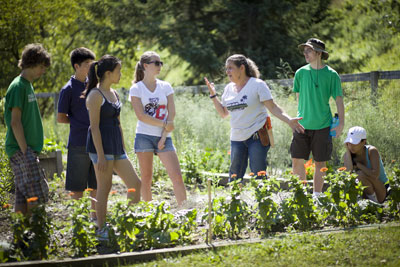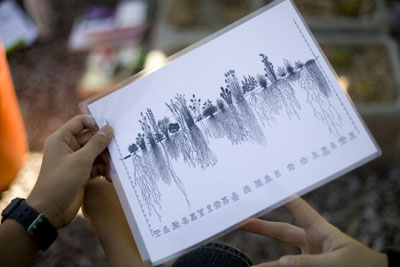Pilot program aims to cure 'plant blindness' among high school students
By Rebecca Harrison


Most people have "plant-blindness" -- they see plants as just background and decor, oblivious to their integral role in our ecology and community, Cornell educators worry. To change that, a Cornell pilot program, Plantations Environmental Education Program for Sustainability (PEEPS), aims to give high school students an appreciation for plants.
The program, which starts July 11, runs daily at Cornell Plantations for six weeks and then continues in the fall, meeting for a few days after school each week and on specific Saturdays.
Six high school students -- from Ithaca High School, New Roots School and Lehman Alternative Community School -- are participating.
PEEPS' goal is "to engage local students in grades 9-12 in a participation-based program that will raise ecological awareness and understanding, and teach skills that will cultivate an environmental ethic for future actions," says Donna Levy, environmental education outreach coordinator at Cornell Plantations.
The PEEPS program will allow these high school students to explore pressing environmental issues through the lens of an on-site project: a sustainable backyard demonstration garden. "The kids all work together on this garden, where they will be involved in planning, implementing and maintenance," Levy says. Weekly hikes and field trips will provide other opportunities for natural field study.
"The backyard can be thought of as a metaphor for your lifestyle," says Levy. "What do you do in your backyard? And, so, how does that impact the environment? And how does what you do in your life -- or your backyard -- connect you to your community?"
For most of the activities, the students will work together. However, for two breakout periods each week, PEEPS students are grouped by age. For example, ninth-graders are the "green partners" and will lead programs at the Ithaca Children's Garden. Tenth-graders are the "garden apprentices" and will work with Plantations' horticultural and natural areas gardeners. The 11th-graders will help to interpret the PEEPS program to wider audiences in the community and their schools as the "environmental ambassadors."
By offering independent study projects, Levy has worked with four Cornell students, who have been part of designing the program from the beginning. Two landscape architecture graduate students, for example, are creating a module to look at the role design plays in planning backyards.
PEEPS has also looked into integrating some of the research in sustainability on campus. For example, Larry Smart, associate professor of horticulture, has given PEEPS some of his shrubby willows for planting in the "sustainable backyard"; Smart grows these willows for use as a biofuel.
The program, with financial support from the Cornell Plantations, aims to keep students involved with hopes that they will return next spring to continue their exploration. Students receive cash awards of several hundred dollars for completing the program.
"This program is important because there are pressing environmental issues now, and they're global," Levy says. "We have to start getting at our general population earlier to solve these problems. My sense is that we are asking young people to save the environment, when they may not even be sure what they're saving. Environmental appreciation, I think, is quite appropriate," Levy notes.
Rebecca Harrison '14 is a writer intern for the Cornell Chronicle.
Media Contact
Get Cornell news delivered right to your inbox.
Subscribe